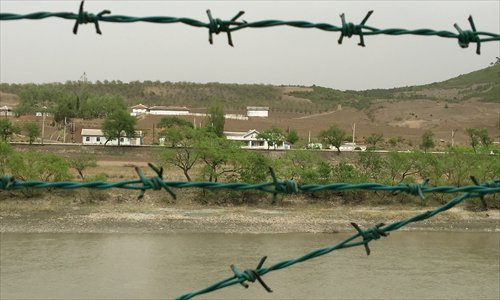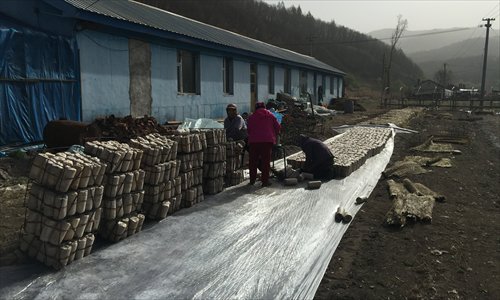After several killings in villages neighboring North Korea, locals look to protect themselves

North Korean towns can be seen through the barbed wire fence from the Chinese side of the border. Photo: Liu Yang/GT

Border residents work on a farm in a village in Helong, Jilin Province. Photo: Liu Yang/GT
Last month three Chinese people were killed in a mountain village along the North Korean border. Speculation is rife that it's another case of hungry North Korean defectors committing crime, following the murder of four Chinese villagers in the same area by a North Korean military deserter late last year. The border areas have through the ages witnessed highs and lows in the personal exchanges between residents on both sides. The way to reduce such cross-border crime some experts say, is to alleviate the economic disparity between the two sides by promoting trade and social exchanges.
Last month, three people were killed in a mountain village in Helong, a border town in Jilin Province along the Tumen River near North Korea. Although no official announcement has been made as to who is responsible, South Korean media reported that three North Korean soldiers committed the crime. It's a sentiment shared by local residents. Many believe North Koreans from across the border are responsible for the crime, as there have been similar incidents in the past.
The China-North Korea border stretches for 1,400 kilometers and the Tumen River flows along 510 kilometers of that. The river originates in the Changbai Mountain, flowing through four cities in the Yanbian Korean Autonomous Prefecture of Jilin Province, before reaching the Sea of Japan in the east.
Border towns on the river have hardly benefitted from their frontline location for business and trade. Instead there has been a fair amount of trouble in the area. Late last year, a North Korean defector crossed the border into China, killing four residents in another Helong village. Such cases of cross-border crime regularly put the safety of border residents in the spotlight. Many wonder why safety between China and its neighbor has become an issue, since many of the border residents are of Korean ethnicity.
Driven by desperation
Local resident Qin Xue'e (pseudonym), 53, of Fuyu village, never expected such an unpleasant encounter with a North Korean. One night several years ago, a North Korean in his 50s, who is probably from the other side of the Tumen River, sneaked into her home looking for food. Qin's brother forcefully removed him.
"We didn't dare give him any food. What will we do if he comes here again looking for something to eat?" Qin said.
Such incidents are not uncommon in border villages. Many people have a similar story to tell or have heard of such an incident from a friend or relative. They may however have dealt differently with such unexpected visitors.
Fuyu is a typical border village along the Tumen River. Looking south from the village across the two-meter-high barbed fence and the river, a North Korean village is clearly visible. But the scenes across the border have been described as worlds apart. On the Chinese side, dozens of neatly maintained houses form the village, but on the other side, houses are rundown. It's believed the disparity in the economic situation across the border has contributed to the trouble.
Like in many villages throughout China, younger people in Fuyu village have left the rural area to work in the cities. They mostly choose to go to South Korea because they speak Korean or coastal Chinese cities like Qingdao in Shandong Province. Among the 30 or so houses in Fuyu, only a little more than a dozen are still occupied. Being so close to North Korea means that people can easily cross the frozen river in winter or wade through the shallow water in early spring into villages in China. The fences set up by border police are hardly a deterrent. Since their livelihoods are not under threat, most people have been tolerant of their hungry neighbors.
"It's pathetic that they do not have enough to eat. It's OK for them to take some food but they shouldn't hurt anyone in the process," is the prevailing attitude in the area.
But relations haven't always been peaceful. On December 27 last year, a North Korean army deserter fled to a Chinese village some kilometers away from Fuyu. There he shot dead four local residents in their 60s and 70s. South Korean media reported that since the incident, the North Korean military has punished the deserter's supervisors. Just a few months earlier, on September 3, 2014, another three villagers were killed. In Longhe, an administration of only 200,000 residents, murders are uncommon. Although Chinese authorities have yet to confirm the identity of the murderer this time, many local people have speculated that it's simply another crime committed by Korean defectors.
"The culprits must be punished," an elderly villager said. He hopes one or two People's Liberation Army (PLA) soldiers will be stationed in the village to improve security. The PLA has a military base not far from the village and border soldiers patrol the roads regularly. But for him, that's hardly enough as the region is too vast for the military to cover.
Changing times
The relationship between people living across the border from one another has been changing over time. The China-North Korea border comprises the Yalu and Tumen rivers and dozens of kilometers of land. Economic and social changes have been experienced on both sides.
Many Chinese residents living in the border cities and villages have the same ancestors as the Koreans, who migrated over hundreds of years. During the height of the Cultural Revolution (1966-76), it was the other way round. People fled to North Korea when its economic situation was better than China's. But since the 1990s when the Chinese economy started to boom and North Korea was gripped by famine, Koreans crossing over in search of food and money became more frequent. The border residents have become more or less used to them. Some say they recall North Koreans bowing to their hosts when leaving after a good meal.
But the situation has not always been harmonious. Jin Qiangyi, director of the International Political Institute of Yanbian University, said desperately hungry North Koreans have been known to kill multiple times along the Tumen River since the mid-1990s. Even though the PLA, armed police and ordinary police officers have tightened security in the border areas, crime still occurs in the most remote villages such as in Shiren, where the April killings happened.
It's tucked away in the mountains and is more than 70 kilometers from the nearest urban area. But it's only about 40 kilometers by mountain paths to the Korean border. Locals say one could get there even quicker using shortcuts. "North Koreans are good at climbing mountains," some said.
Villagers have resorted to implementing their own security measures. Keeping a dog is common in the mountain villages. After last year's shooting in Nanping, some villagers bought Tibetan mastiffs for protection.
Given that the most recent murders all happened in Helong, it has raised questions about why adjacent cities like Tumen and Longjing have been comparatively peaceful. Local residents believe it could be because the section of the Tumen River that runs through Helong is much shallower than in nearby cities. In the bitter winter, the river freezes and people can simply walk over; in spring, the water level is so low, one can easily jump over. Defectors or deserters also tend to prefer hiding out in smaller villages, instead of bigger border towns like Tumen.
Shiren villagers told the Global Times that the father and daughter who were killed last month didn't live in the village permanently, but just outside of it. They had moved to Shiren to grow ginseng and lived in tents in the forest.
Villagers also said that spring and fall are the most likely seasons for North Korean visitors to cross over. When their winter food storage is depleted, they might cross the border into China, while in fall, during years of bad harvest, illegal border crossing could rise.
Experts in China-North Korea relations agree that the diplomatic ties between the two countries are frostier than in the past, but local observers said they didn't believe this was contributing to border crimes.
Trade and tourism have also largely been unaffected by the criminal incidents. In the border towns like Nanping, exports to North Korea are transported as usual, over bridges crossing the Tumen river. Local tourism bureaus also operate normally. To visit Raseon, Chinese tourists only need to provide an ID, while they must carry their passports when visiting Pyongyang.
An observer who requested anonymity told the Global Times that North Korea should be more open economically. China has been working to improve economic cooperation.
In March, the State Council approved the establishment of a 0.76 square-meter, state-level border economic cooperation zone in Nanping, to boost trade with North Korea.
"North Korea may soon come to realize that its future depends on China, because of its geographical proximity," said an observer.
Newspaper headline: Border crime